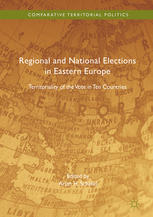

Most ebook files are in PDF format, so you can easily read them using various software such as Foxit Reader or directly on the Google Chrome browser.
Some ebook files are released by publishers in other formats such as .awz, .mobi, .epub, .fb2, etc. You may need to install specific software to read these formats on mobile/PC, such as Calibre.
Please read the tutorial at this link. https://ebooknice.com/page/post?id=faq
We offer FREE conversion to the popular formats you request; however, this may take some time. Therefore, right after payment, please email us, and we will try to provide the service as quickly as possible.
For some exceptional file formats or broken links (if any), please refrain from opening any disputes. Instead, email us first, and we will try to assist within a maximum of 6 hours.
EbookNice Team

Status:
Available5.0
22 reviewsThis book is the second of two studies which systematically explore territoriality of the vote in Europe. They investigate when and where voters treat regional elections differently from national contests and aim to increase our understanding of the dynamics of electoral competition, which have become increasingly multifarious and complex in many countries due to the establishment and strengthening of regional government. This volume brings together leading experts on elections who analyze differences between regional and national electoral outcomes in ten East European countries since 1990. Based on a common analytical framework, each chapter investigates congruence between regional and national elections and traces and explains second-order and regional election effects. The editors applied a similar analytical framework in Regional and National Elections in Western Europe (Palgrave, 2013) which focused on 13 West European countries, enabling the authors to compare regional electoral dynamics between Eastern and Western Europe and observe to what extent explanations for territorial heterogeneity in the vote in the West also apply to the East. This book will be of particular interest to advanced students and scholars in the fields of comparative politics, regional studies, Eastern-European politics, and democratization.